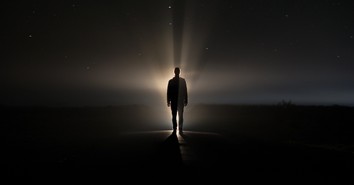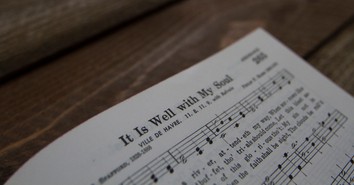Finding Joseph in "The Nativity Story"

When Oscar Isaac took on the role of Joseph in the upcoming Bible epic, “The Nativity Story,” the 26-year-old actor had no idea what he would soon be facing.
It wasn’t merely the thought of his first major film role, only a year after leaving Julliard. Isaac had played opposite Rosario Dawson in the Shakespeare in the Park production of “Two Gentlemen in Verona” right after graduation. He had also done an episode of TV’s “Law and Order” and shot two other movies, including next year’s “Guerrilla,” directed by Steven Soderbergh, where he worked with Benicio Del Toro.
Not bad for a Guatemalan-born kid raised in Miami – even if he does look like Antonio Banderas, a few years younger.
Nor was it the weather in Matera, Italy, where “The Nativity Story” was shot – which reached a startling 115 degrees one day – that challenged Isaac. It was, he says, the thought of playing the earthly father of God’s son.
“When I was reading and working on the script, I remember thinking, ‘How do I play this? How do I play that I’m going to have the son of God?’” Isaac said. “It’s such an abstract idea.”
The film, which is directed by Catherine Hardwicke (“Thirteen,” “Lords of Dogtown”), focuses on Mary and Joseph’s betrothal and their treacherous four-day journey to Bethlehem. Written by Mike Rich (“Finding Forrester,” “The Rookie”), the drama boasts a poignant screenplay, historically-accurate sets, and a cast of top-notch actors that include Oscar-nominated Keisha Castle-Hughes (“Whale Rider”) as Mary, Shoreh Agdashloo (“24”) as Elizabeth and Alexander Siddig ( “Syriana” ) as the angel Gabriel.
I recently sat down with Isaac in Los Angeles, where he discussed this momentous role and how the part impacted his own faith. Here’s what he had to say. ...
You look much younger without the beard.
Yeah, without the beard and the first century brow – you know? It’s a little easier nowadays. (laughs)
Mike [Rich, the screenwriter] said this isn’t a typical love story. Would you agree?
I think the fact that there’s a man who loves God so fully and loves this woman so fully and has to share his love with God is pretty untraditional, yeah! (laughs) It’s an interesting character study as well. He has to share his wife with God. He wanted to have a family with this woman. He wanted to have a nice, normal life in his little house that he’s building and suddenly he forced to….kind of, ‘Why her?’ you know? ‘I love her so much, I love you so much, but why couldn’t you have picked anybody else?’
It was so nice to see the character of Joseph fleshed out. Generally, in these types of films, he’s the one character who is off in the background.
Yeah, if you look at all the paintings, he’s the creepy looking guy in the back with all the sheep, just trying to get a space in the picture! (laughs)
And old.
Yeah, old! Very old. But that’s something that Mike tried to sprinkle throughout the film – where maybe Jesus learned some of the things Joseph teaches, like the comment [Joseph makes in the temple], “This is supposed to be a holy place!” Some of those values that are maybe instilled, perhaps from his father. And really, the fact that this is a man whose whole being is one of humility. And I think that was one of Christ’s major teachings.
In “Fiddler on the Roof,” you hear the refrain, “Oh, he’s a good man.” That’s also a refrain in this film, isn’t it?
Right. The Bible describes him as “righteous” – and that’s it. So how do you, as an actor, play “righteous?” What does that mean? Do you stand up straighter? (laughs) So I had to figure that out, and I realized that it’s actions. And for me, or for Joseph, righteous meant love. He looks at Mary. He doesn’t stone her. He doesn’t humiliate her publicly – because he’s righteous. And when I did the scenes, even though I had the anger and the rage and the fear and the doubt, I just loved her so much that suddenly I realized that righteousness means just unselfish, humble love.
Wow.
And that’s what took me throughout the rest of the film.
One of the most poignant moments in the film is when you and Mary look at each other and you say, “How will I ever teach him anything?” What went through your mind with that thought? How do you teach the son of God?
That was definitely one of the challenges. When I was reading and working on the script, I remember thinking, ‘How do I play this? How do I play that I’m going to have the son of God?’ It’s such an abstract idea. I just didn’t know what to think about it. Then I realized that that was exactly what Joseph was thinking. He has no clue what that means. He doesn’t know if he’s going to come out a full man, if there are going to be millions of angels – or what. He has no idea what to expect. So that gave me some freedom to think about those things.
Can you talk about some of the resources and experience you drew upon to go into these deep emotions, especially as someone who is very young and, I presume, does not have children.
It’s funny. When we were in Italy rehearsing the film, before I really had my “righteousness equals love” revelation, every time we rehearsed that scene where she told me she was pregnant, I would leave. I couldn’t stay in the room. I’d want to walk out and hit something. I couldn’t figure out how to do the scene. I even said, ‘Maybe we should just change it, because I just can’t get there.’ I called my professor from Julliard and he said, ‘Well, you need to find a reason to stay.’ It’s such a simple thing to say but… It’s not saying that you’re not feeling all those things, or that you’re not wanting to choke her or do something, but why do you stay? I think that helped me figure it out, to think about how you can attack a scene in the deepest way possible.
Why does he stay?
Because he’s completely in love with her. And you can say that love comes from God, but there’s a depth of love that he had.
How much theological discussion was there on set, from changes in script to theology to history?
A lot. For me, that was incredibly important – that this was a young, Jewish man in the first century – and what does that mean? Also, little things. When I do the prayer for the bread, I was told not to say “Adonai” but “Adoshem,” because apparently you don’t say the name of God unless you are in certain circumstances.
How did you get the accent down so well?
That’s also from Julliard. They’re really good at teaching you how to manipulate the muscles in your mouth to do different accents pretty quickly.
Was there any kind of spiritual experience for you, making this film? Was it just work or were there moments where you were alone, and maybe thought about things that you wouldn’t have thought about had you not made this movie?
Absolutely. I did read a lot in the Bible. When I picked up that thing about love, I had started to read about love – what’s biblical love. I was reading about that, and the power of humility. It had never really hit me before. When I saw the film, I said, ‘Oh, my gosh. This is the greatest act of humility.’ This is how God decides to come to Earth. That’s a really powerful message.
So you have had a bit of a faith walk yourself? Can you tell us a bit like what that was like, both before and after the film?
Yeah, definitely. I definitely grew up in a very devout Christian home. Then, as Joseph, you know, you kind of go through this journey of asking yourself questions, wondering if you’re listening to God in the right way. You rebel in some ways against what your parents teach you, and it’s definitely been a revolution of how I think. During the film, I didn’t want to get into it in my own head, you know, but doing the film forced me to think about those things – my own spirituality. Having to play a pious Jewish man and not knowing what that was like. Because I think the Jews in Israel during the first century, there was no separation between them and God. God was integral to their lives, and to have to play somebody who was that devout, you have to put yourself in that place.
During a part of the journey, Mary prays, ‘Lord, help us.’ Did you ever find yourself praying in the midst of filming, even for a scene to be over, or an animal to cooperate?
Well, even the most non-religious people, the dire circumstances, I think, say, ‘God, help!’ But I would. I did. In almost every scene, I would pray for some kind of illumination. For instance, the Gabriel scene was a hard, hard scene. How do you play seeing an angel? So I prayed. Then I literally just opened the Bible and it opened to Jeremiah, where it talks about this guy and how he reacted when he saw the angel. I thought that was kind of funny.
I loved the scene where you paid off the Roman soldiers for the donkey that belonged to Mary’s father. It was so touching, and so humble.
Right, yeah. And it’s not like this guy was loaded.
It was also brave. There was a risk. These were armed soldiers who could have just as easily killed you for asking.
Yeah, exactly.
Then again, maybe he just wanted an excuse to talk to Mary!
Yes, but all those things are happening simultaneously. He does want to just talk to her. He wants to be in a room with her, even if he doesn’t have anything to say, even if it’s awkward. But that’s what is really special about “The Nativity Story.” It treats them as real people, but yet you’re still able to get all the power of the story.
I understand that you actually made the staff that you use in the film. Why did you decide to do that?
Well, first of all, [Joseph’s] hands were key – physically. After figuring out what he was going through emotionally, I had to figure what he was like. I had little dainty actor hands, so it was important for me to have the carpenter, first-century, person-of-the-land hands. So, for a month, with technical advisors, we worked. I worked with first century tools. And every day I’d go and I’d make something. I’d do masonry work. So by the time shooting came, those hands were calloused and swollen and scratched. It gave me something less to think about – to be self-conscious about.
Do you still have the staff?
(Nods) I take it with me on the subway! (laughs)
Rated PG for some violent content, “The Nativity Story" opens Friday, December 1 in more than 8,000 theaters worldwide.
Click here for more information.
Originally published November 28, 2006.







